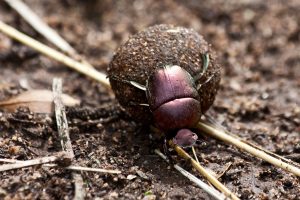Organic farms promote beetles that control foodborne pathogens spread by flies
 Photo Credit: Federico Moroni
Photo Credit: Federico Moroni
A recent study in the journal Biological Control surveyed beetle communities in conventional and organic farms, and found that only organic farms fostered the right beetle species that directly suppresses E. coli on farms. This study is important because it shows that supporting more biodiversity can reduce food safety risks on organic farms, which often rely on animal-based soil amendments for nutrient management. Foodborne pathogens such as E. coli can enter a cropping system through livestock and other wildlife feces. When flies that eat that feces also make contact with crops, they can become a vector that spreads contamination. Certain beneficial beetles that also feed on feces (i.e. dung beetles) can directly reduce the amount of pathogens like E. coli, so that when flies feed on the feces shared with the dung beetles, there is less contamination to be spread in the first place.



